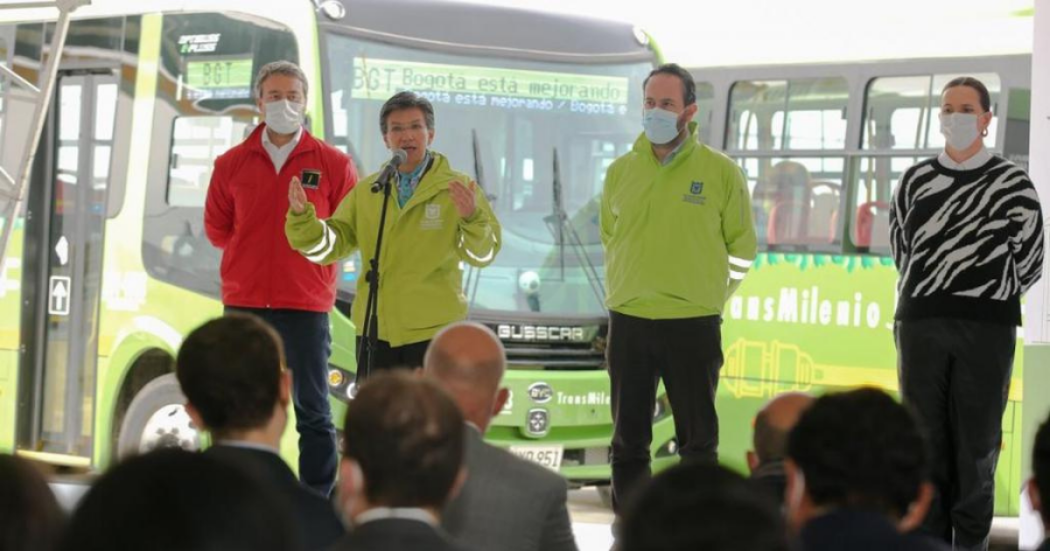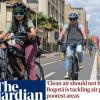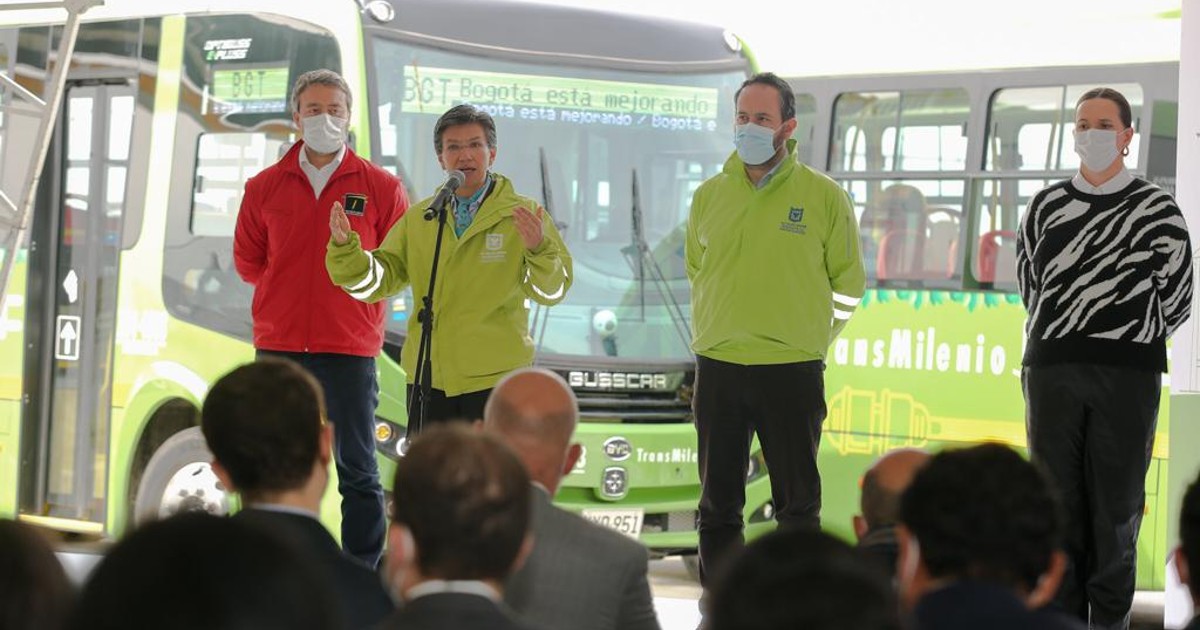More than 30,000 users a day already benefit from the 172 fully electric buses that came into operation to provide their service from Fontibón, connecting citizens with the boroughs of Suba, Chapinero, and Rafael Uribe, mainly.
This Monday, this new fleet and the fifth electrical bus depot in the city were unveiled by the Mayor's Office of Bogotá, through Transmilenio SA, the Mueve Fontibón concessionaire, BYD, and Enel X - Enel-Codensa's business unit.
“When it comes to CO2 capture, using these 172 buses is equivalent to planting 148,000 trees in Bogotá. The environmental impact of this project is really that significant,” said Mayor Claudia López.
“Not only is this is very good news in transportation, mobility, and care for women and families, but it is also a cost-efficient investment and represents the fulfillment of the new Bogotá Reverdece 2022-2035 Zoning Plan (POT, as per the acronym in Spanish) that proposed having a multimodal transportation system so that Bogotá is not TransMilenio-dependent”, added the Mayor.
This new electric fleet, made up of 83 midsize buses with a capacity for 80 passengers, and 89 small buses with a capacity for 50 passengers, will provide the service through six routes. Of these, three routes were part of the Provisional SITP scheme, and were previously covered by 89 vehicles that have been taken out of circulation. The remaining three were provided by other System concessionaires. With the arrival of this new fleet, the aim is to improve the frequency of these services.
"For us it is a source of pride to deliver these 172 fully electric buses, which will offer great advantages to residents of Bogota with these new six routes in the boroughs of Fontibón, Suba, San Cristóbal, and city’s downtown and surrounding area," said Felipe Ramírez, District Secretary of Mobility.
The 172 new vehicles are added to the 483 zero emission buses that are operating in the System in the boroughs of Usme, Suba, Fontibón, and the areas of Perdomo and Venecia; thus raising the total to 655 fully electric buses. With this addition to the fleet, the zonal component of the System now includes 1944 clean technology buses (electric, gas, and Euro VI diesel) on the roads in Bogotá. During 2022, 830 additional electric vehicles will arrive, to raise the total to 1485 electric buses in operation.
“The 1485 electric buses will do almost more than double what the almost one million trees that we will plant in Bogotá will do. This is having clean, sustainable, caring, timely, quality, safe, and dignified transportation for residents of Bogotá," Mayor López stressed, adding that "this is thanks to the effort of many people, especially those of us who pay city taxes."
“The taxes are there, and we want everyone to see them on the road, to know that every time they see a green bus in the city it is a clean bus, and every time they see a yellow bus it is a low emissions vehicle. At the end of this year, Bogotá will be able to proudly say that it has the largest electric bus fleet and the cleanest mass public transportation system of any city in the world, outside of those in China,” she said.
For his part, Álvaro José Rengifo, general manager of Transmilenio SA, said that "the entry of these new buses is necessary to finish consolidating our system and improve the service we are providing to our users."
The buses are BYD brand, powered by electric motors with zero polluting emissions, they are equipped with technological elements to improve users’ travel experience with noise reduction, Wi-Fi access, USB ports for cell phone charging, screens and informative route audio, GPS, speaker,s and microphones that communicate directly with the Control Center, accessible platforms for people with disabilities, have an assisted ascent or hill start mechanism, rapid energy recharging, and automatic fire control.
Users will be able to see the on-board screens, the information panels, and their mobile devices, which they can keep charged and connected to the Wi-Fi network to consult system information such as routes, services, the TransMiApp, novelties, news, and much more, which will allow them to make the right travel decisions and to move around comfortably.
“The entry into operation of this new group of electric buses will contribute to the reduction of greenhouse gas emissions, especially in the borough of Fontibón and the southwestern area of Bogotá, one of the areas most affected by fixed and mobile pollution sources”, said Lara Zhang, regional director of BYD Latin America.
In addition, according to BYD, the fleet of the five new batches of buses that will come into operation have a new generation of batteries, which have better energy density (less weight and volume per unit of energy), which means greater autonomy for SITP requirements, in addition to having a design in the chassis-carriage pair, suitable for the topography and condition of Bogota roads. Moreover, this has contributed to the prompt reactivation of the Colombian economy, as these efforts are linked to national industry. The operation of these buses will directly and indirectly benefit more than 500,000 inhabitants in Bogotá.
With the entry into operation of the 172 electric buses, 1.5 tons per year of particulate matter will no longer be emitted, and the emission of 3,200 tons/year of CO2 will be avoided. Once the entire fleet of 1485 electric buses is operating, 94,300 tons of CO2 per year will no longer be emitted. This is the equivalent of what 42,000 private cars produce in this same period.
In addition to the benefits for users and the improvement of air quality, with this new fleet’s entry into operation, 502 jobs were directly generated through the Mueve Fontibón concessionaire. The workers have the experience and suitable training to mobilize thousands of citizens. Likewise, the Mueve initiative promotes national industry and job creation through contractors and suppliers. An example of this was the manufacture of bus bodies, which created jobs for an average of 1406 employees, of who 165 were women.
“We are happy and proud to hand over this operation to the Fontibón borough and to Bogotá residents citizens. We will mobilize close to 30,000 passengers a day, which will favor the environment, and all those who interact with the electric bus system”, said Andrés Fernando Cortés Jaramillo, general manager of Mueve.
The fifth 100% electric bus depot in Bogotá
The new zero-emission buses operate from the Escritorio depot, located at Carrera 134 #22a – 84 in Fontibón. This infrastructure has 81 chargers, each with a power of 150kW, which means that when two buses are connected, each one receives 75 kilowatts (kW) of power. In this case, the estimated charging time for electric buses is four hours and if charging is done for one bus at a time, charging would take approximately two hours.
The Escritorio depot will be operated by the Mueve Fontibón concessionaire. The construction was carried out by Enel X, one of Enel-Codensa’s business units, with an investment of approximately 60 billion pesos in construction and fitout costs, and around 15 billion additional pesos in infrastructure and networks. It is important to note that there were 400 people in the work team for the assembly and adaptation of the depot. Additionally, a team of 220 people, of who 15 percent were women was put together to work on the electrical infrastructure and adaptations.
“The city now has five fully electric bus depots, with the capacity to operate about 650 buses, which give the city a new air. We are proud to be partners in this project that integrates new technologies and sustainable solutions to transform Bogotá into one of the main electric capitals in Latin America,” said Lucio Rubio Díaz, General Director of Enel in Colombia.







